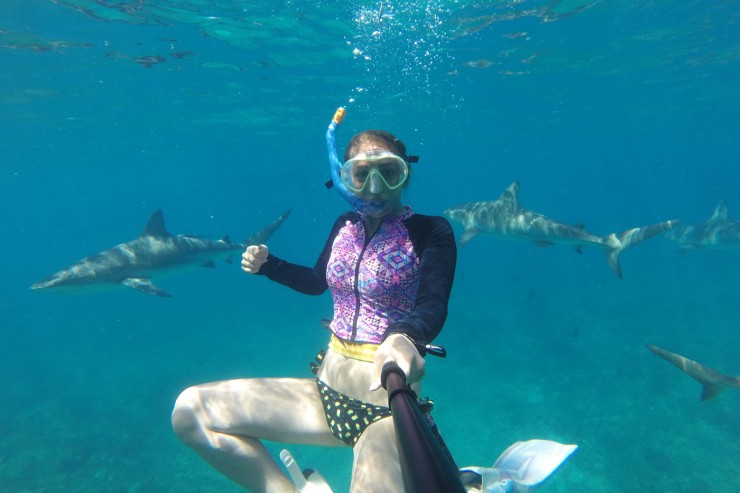by Joe O’Connell
When given the chance to study and swim with sharks for a few months, most people would probably politely—or more likely impolitely—decline.
Not Northeastern student Eva Hayes, S’16. When she found a position available at the Bimini Sharklab in the Bahamas, she immediately applied for what she called her “dream co-op.”
“Growing up in California I’ve always been fascinated with sharks,” said Hayes, a combined major in international affairs and environmental sciences. “We’d swim in the ocean and were aware there could be sharks in there.”
Her work at the lab
The Sharklab, a nonprofit established in 1990, works to advance knowledge of marine animal biology, especially sharks and rays, through cutting-edge field and laboratory research. Hayes has been working there since March, and her many responsibilities range from non-invasively tagging sharks for tracking purposes, to helping advanced degree students with their research projects.
A primary focus of the lab is studying the habits of juvenile lemon sharks. To help the lab collect data, Hayes worked some 12-hour night shifts at a lemon shark nursery tagging all of the lemon sharks they catch and release.

Hayes holding a juvenile lemon shark. Courtesy photo
One of her most rewarding experiences happened when she first arrived there in the spring, during hammerhead shark season. It was then that she got to dive with great hammerheads—the largest of the species—and help tag them.
“This co-op has definitely helped me delve into the shark world,” Hayes said. “I’m very interested in shark habitat loss, which I have seen a direct impact of here.”
Beyond what she has learned about sharks, Hayes said she has also gained experience in community outreach and education, and in designing experiments.
Sharks are in the news
Sharks have been making a lot of headlines in recent weeks due to a string of attacks off the coast of North Carolina. Hayes noted that her Sharklab colleagues have been keeping a close eye on the news, and the belief is that the attacks could be related to a number of factors. Among them are that warmer ocean temperatures are resulting in increased shark metabolism, and that the water closer to shore is saltier than normal.
Experts say that bull sharks are among those thought to be involved in these incidents. In fact, Hayes has had two encounters with bull sharks, which she described as “unpredictable,” during her co-op at Bimini. She said both times were a bit surprising: one was while she was diving with hammerheads and the other was when she was swimming after work. She was not attacked in either case.
“In the case of shark attacks, they are doing test bites,” Hayes explained, cautioning swimmers to be aware of their surroundings when they’re in the ocean. “It’s a case of mistaken identity. They are trying to feed but they aren’t interested in humans.”
This week also happens to be “Shark Week,” Discovery Channel’s weeklong dedication to all things sharks. “It’s super fun for us because we just really love sharks,” Hayes said, “and we love it because it gives sharks positive media attention.”
Originally published in news@Northeastern on July 9, 2015.
Shark photo courtesy Magnus Bråth

